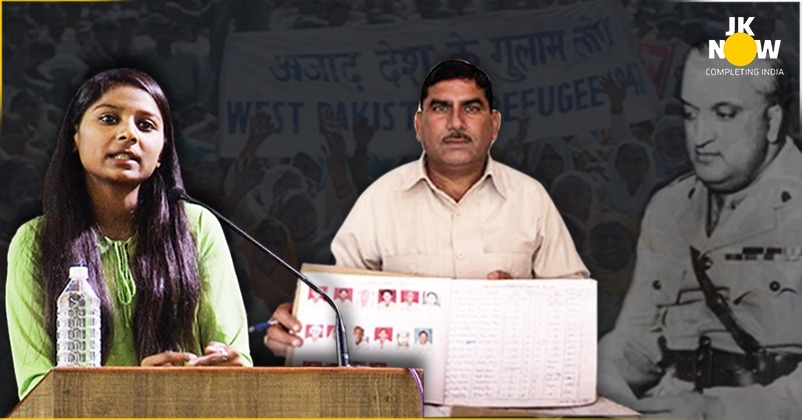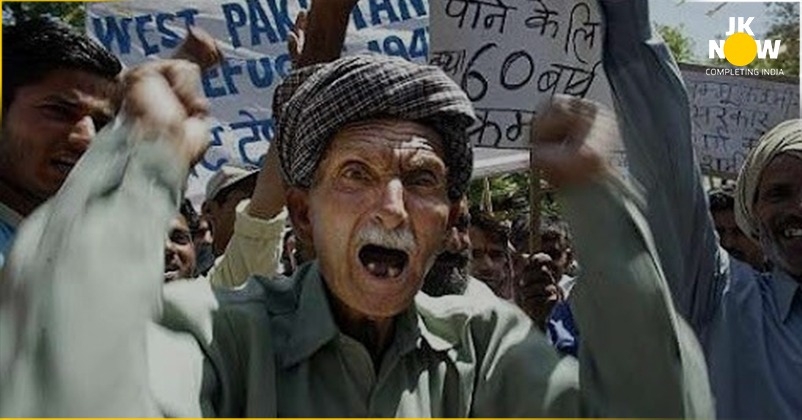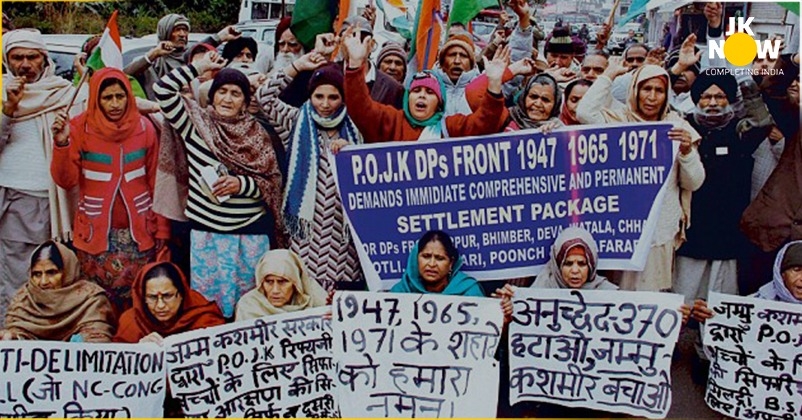How the State Subject law of Maharaja is entirely different from the bogey of lies of Permanent Resident Certificate (PRC) in Article 35A
| 11-May-2019 |

Article 35A is the most controversial provision and calling it an unconstitutional provision would not be wrong. The provision allows the state government to discriminate between Indian citizens living in other parts of the country from the Permanent Resident Certificate (PRC) holders of Jammu and Kashmir (J&K). Also, discrimination persists with not only those Indian citizens who are living in other parts of the country but also with those who are living in J&K, without PRC, for decades. This provision allows discrimination on the basis of caste, class, gender, and place of origin in clear contravention to the fundamental rights enshrined in the Constitution yet legal impunity was given to this discriminatory provision when it was inserted clandestinely in the Constitution of India. Ironically, a few cunning people in India give different excuses for ensuring that this discriminatory and unconstitutional provision must stay in the Constitution of India. They even went to the extent that they try to show that Article 35A and the 1927 notification of Maharaja Hari Singh are same. Further, they even did not differentiate between State Subject Law of Maharaja Hari Singh and PRC. Hence, every endeavor is made to justify separatism and discrimination and that too in the name of Maharaja Hari Singh.

The State Subject law of Maharaja Hari Singh
Maharaja divided the state subjects into four different classes viz. Class I. - All persons born and residing within the State before the commencement of the reign of His Highness the late Maharaja Ghulab Singh Sahib Bahadur, and also persons who settled the rein before the commencement of samvat year 1942, and have since been permanently residing therein; Class II. - All persons other than those belonging to Class I who settled within the State before the close of samvat year 1968, and have since permanently resided and acquired immovable property therein; Class III. - All persons, other than those belonging to Classes I and II permanently residing within the State, who have acquired under a rayatnama any immovable property therein or WIZO may hereafter acquire such property under an ijazatnama and may execute a rayatnama after ten years continuous residence therein and; Class IV. - Companies which have been registered as such within the State and which, being companies in which the Government are financially interested or as to the economic benefit to the State or to the financial stability of which the Government are satisfied, have by a special order of His Highness been declared to be State subjects. For the outsiders, the state issued order dated 27th June 1932. According to this order, “The foreign nationals residing in the State of J&K shall not acquire the nationality of the Jammu and Kashmir State until after the age of 18 on purchasing immovable property under permission of an ijazatnama and on obtaining a rayatnama after ten years continuous residence in the Jammu and Kashmir State as laid down in Notification No.-l-L. of 1984, dated 20th April, 1927. Certificates of the nationality of the Jammu and Kashmir State may, on the application, be granted by the Minister-in-Charge of the Political Department in accordance with the provision of section I of this Notification.”

Maharaja’s response to Indian American Commission for Women (IACW)
Indian American Commission for Women (IACW), which was headquartered in Washington D.C., sent a questionnaire to E.B. Howell, then resident in Kashmir representing the British, on July 2, 1929, asking specific questions on the laws and customs affecting the status of women in J&K. In reply to the questions, the Chief Justice, High Court of Judicature, Jammu and Kashmir, Srinagar categorically said that neither male nor female nationals of Jammu and Kashmir lose their nationality even if they marry an outsider. He also mentioned that even the marriage of a man or a woman with any foreigner does not make the spouse state subject automatically. It said naturalization subject is not applicable in case of foreigners, who have married to the nationals of J&K. The Chief Justice categorically mentioned that 10 years of residence and permission to acquire property are essentially applicable to become state subject of class-III, even if the foreigner has married a State Subject. Also, in response to the question of IACW related to children, the Chief Justice mentioned that the children will be a national of Jammu and Kashmir if either mother or father is a national of Jammu and Kashmir.
Article 35A
Article 35A is discriminatory, oppressive and unconstitutional. The provision states that "35-A. Notwithstanding anything contained in this Constitution, no existing law in force in the State of Jammu & Kashmir, and no law hereafter enacted by the Legislature of the State,
(a) defining the classes. of persons who are or shall be, permanent residents of the State of Jammu & Kashmir; or
(b) conferring on such permanent residences any special rights and privileges or imposing upon other persons any restrictions as respects: -
(i) employment under the State Government;
(ii) acquisition of immovable property in the State;
(iii) settlement in the State; or
(iv) right to scholarships and such other forms of aid as the State Government may provide, shall be void on the ground that it is inconsistent with or takes away or abridges any rights conferred on the other citizens of India by any provisions of this part."
This Article was added between Article 35 and Article 36 of the Constitution in Part-III of the Constitution that deals with Fundamental Rights. Paradoxically, this provision was violating fundamental rights yet it is added in the chapter of fundamental rights.
State Subject versus Permanent Resident Certificate (PRC)
There are many contradictory things in PRC and it is completely opposite to the State Subject clause of 1927. The important points of difference are:
• Like any other princely(state), the state of Jammu and Kashmir then was a different entity, having its own rules, laws, and procedure to govern a limited geographical area. The word ‘nationals’ was used for the resident of Jammu and Kashmir in the order of 1927 to highlight the fact that they were under the administrative arrangements with the British but the State was sovereign. It is in itself clear that J&K was perceived as a separate nation by the ruler until the state acceded to India. Presently, not only residents but even the whole state of Jammu and Kashmir are very much part of India and they are not separate from India. Hence, the residents of J&K are allowed to buy land, take education, avail scholarships, and other benefits in any part of the country. But the PRC provision promotes discrimination on the basis of place of residence, as a PRC holder of J&K gets all the benefits in the State whereas the non-PRC holders are deprived of everything. Hence, two class of citizens were created in clear contravention to the 1927 notification, where the nationals have equal rights in J&K.
• Maharaja’s 1927 order was not against the residents of Jammu and Kashmir whereas the PRC provision is against the residents of J&K. Since J&K became a part of India, there should have been no difference between the resident of J&K and the resident of any other state. The theory of separate identity within one single country was against the wishes of Maharaja Hari Singh.
• The residents from other places were allowed to acquire the residentship of J&K provided that he or she should be 18 years or above, purchase the immovable property under permission of an ijazatnama and on obtaining a rayatnama after ten years continuous residence in the Jammu and Kashmir State. But the PRC clause put a blanket ban on acquiring residentship in J&K. As a result, the Indian citizens, who have been living in the state of Jammu and Kashmir since 1947 like West Pakistan Refugees, Gorkhas, Valmikis have not been able to get the PRC.
• The State Subject order of Maharaja was pro-people but the PRC clause is against the interest of the residents of the state. Many of the residents did not get the PRC though they have resided in the state for their entire life. Their third or fourth generation living in the state yet they are not conferred the PRC. Consequently, they are denied the right to a dignified life.
• The 1927 order of Maharaja was not gender biased and both men and women had equal rights. If a woman married an outsider, she was not discriminated and if a man married an outsider, no preference was given to his spouse. On the contrary, PRC clause discriminates between male and female, as the spouse of male gets the PRC even if she is a non-PRC whereas the spouse of female does not get the PRC if he is a non-PRC holder.
• Under the State Subject clause, the children of male or female used to become State Subjects even if the spouse is happened to be a foreigner. But the PRC clause is not extended to the children of a woman, who has married a non-PRC holder. The State Subject clause of 1927 does not make the children illegitimate whereas PRC makes the children illegitimate if a woman marries a non-PRC holder.
• In a blatant abuse of the PRC clause, even the Pakistan Occupied Jammu and Kashmir (POJK) displaced people, who were the State Subjects during the reign of Maharaja Hari Singh, but settled in other states of India were arbitrarily denied the PRC.
The State Subject clause of Maharaja Hari Singh was quite different from the PRC clause that has been inserted through Article 35A. Maharaja’s order regarding State Subject was for the protection of the nationals of J&K but the present clause of PRC protects the interest of a few selective people of Kashmir, the smallest region of the entire state of J&K. Unfortunately, the Maharaja’s State Subject clause was wrongly quoted in the context of PRC. PRC is not at all related to State Subject. Maharaja Hari Singh was progressive and the PRC clause presents the regressive mentality of a few elite classes of Kashmir.
Tags:
